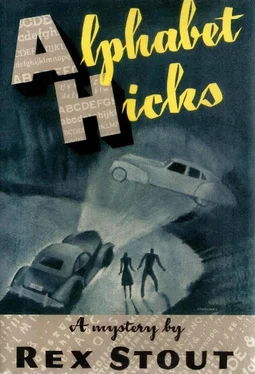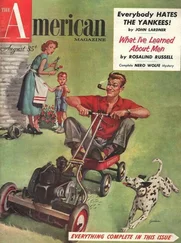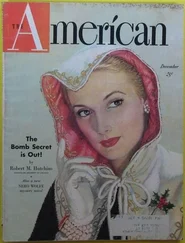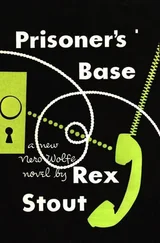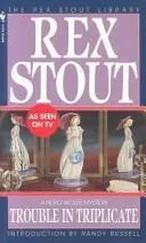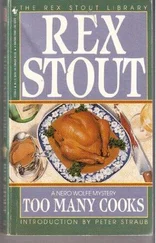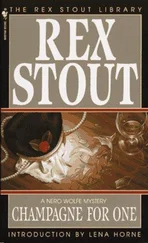He stopped abruptly because Heather had buried her face in her hands. A shiver ran over her, all over her body.
Ross’s jaw fell. He got up and started for her, then dropped back again and sat there with his clenched fists at his sides on the rock.
“Don’t do that!” he implored her. “For God’s sake—”
“Go away,” she said from behind her hands. “Oh, go away...”
“I will not go away,” he said doggedly. “I won’t talk any more. I won’t say anything, but I won’t go away.”
After a minute the chipmunk appeared at the end of the log again, then ran to the middle of it and perched there for a good look at them. A last ray of the setting sun found its way through the foliage of the trees and brush and made his coat a spot of golden fire.
At the house Hicks found about what he expected to find.
A jumble of parked cars filled a large graveled space in front of the garage. Through a rear window he caught a glimpse of the florid face and large form of Mrs. Powell, in the kitchen. Encircling the house to the side fronting the woods, he came to the side terrace with its screen of shrubbery. A glance showed him that the body of Heather Gladd’s sister was no longer there; but a rough outline in chalk showed where it had been. A man in a Palm Beach suit and a battered Panama hat stood at the edge of the terrace staring thoughtfully at the sky as if to read the weather, and in chairs against the house two other men sat. One wore the uniform of the State Police; the other was George Cooper. When Hicks had first seen that face with the sharp pointed nose, in a booth in Joyce’s restaurant, it had been white and puckered with distress; now it was a deadpan, drained of all expression by shattering disaster.
Hicks started for the door to the living room.
“Hey,” the cop growled, “back up! Who are you?”
“The name is Hicks.”
“Oh. Where’ve you been?”
“Sitting on a rock. I’d like to see Mr. Dundee.”
“He’s inside with the lieutenant. Don’t go in there. You can wait here.”
“Then I’d like to see Mr. Brager.”
“He’s in with the district attorney.”
“Is anybody interested in me?”
The cop nodded. “You’ll get attention. Have a seat— Hey, where you going?”
Hicks, who had started off, turned to say distinctly without elision, “I am going to the kitchen to get a drink of water,” and, without waiting for written permission, retraced his steps around to the rear of the house, opened the door and entered.
A saucepan dropped from Mrs. Powell’s hands and clattered on the floor.
Hicks stepped across and retrieved it, but when he straightened up to present it to her, he found that she had backed clear against the wall and was regarding him with an expression of terror that was unmistakable. She was paralyzed with fear.
“Scream,” Hicks told her encouragingly. “Go ahead and scream.”
The woman flattened herself against the wall and made no sound whatever.
Hicks put the saucepan on the table. “It’s like this,” he explained. “Even if you’re correct in concluding that I’m the murderer, your conduct is unreasonable. Even if I killed Mrs. Cooper it doesn’t follow that I want to kill you too. The fact is that what I want is a drink of water.” He crossed to the sink and opened the faucet, got a glass from a shelf, filled it, and drank. “That’s good water. Above all, you should have screamed. If I had intended violence, your failure to scream would practically have made you an accessory.” He refilled the glass and drank again. “In an assault case in Brooklyn in 1934, the judge held that—”
“You get out of here!” Mrs. Powell squeaked.
“I would like to ask if you ever—”
“Get out of here!”
“But I want to know. Have you ever met Mrs. Dundee Senior?”
“Get out of here! I will scream! I can scream!”
“Oh my lord,” Hicks muttered in disgust. He had his pick of two doors, not counting the one he had entered by, and chose the one on the left, which was a two-way door, and found himself in the dining room. It was uninhabited. Here again was a choice of two doors. The one at the right was closed; the one opposite him stood open, and through it could be seen a stair, which was what he was looking for. Making for it, and entering the hall where it was, he was confronted by another policeman in uniform.
“Where you going?”
“Bathroom,” Hicks said, and detoured around him and started up the stair.
With no pause on the landing at the top, he proceeded with a confident step down the hall, though he was not particularly confident about anything. Certainly he was by no means confident that the sonotel plate of the conversation between Mrs. Dundee and Jimmie Vail was concealed in that house, but there was a fair chance that it was, and if it was, he wanted it. From the seven doors which were disclosed to a quick survey, he selected one at random, turned the knob, and opened it. One glance at its interior was enough to identify it; the array of toilet articles on the dresser would alone have sufficed; it belonged to Heather Gladd. And it smelled like her. He backed out and closed the door and tried another down the hall. It too was unlocked. He opened it and passed through, with no special caution.
To a swift glance around no one was visible. Hicks had rather hoped to hit on Ross Dundee’s room for a start, regarding that as the most likely for his purpose, but a dozen details revealed to a hasty inspection made it evident that the hope had not been realized. More than half of the books in shelves that covered an entire wall were in German, and letters under a paperweight on a large flat-topped desk were addressed to Mr. Herman Brager.
Hicks moved rapidly and silently. None of the drawers of the desk was locked, and none had a sonotel plate among its contents. It was the same with the drawers of a chiffonier, and with the shelves of a large clothes closet. Shelves in the room displayed neat stacks of scientific journals, and he peered at them for a gap anywhere in their edges, but saw none. He looked at the bed, and shook his head; and went to the books and began sliding them out and tipping them for a peep behind. Suddenly he stopped, muttered to himself, and went and sat in the chair at the desk.
He was, he thought, making an ass of himself. In the first place, there was no reason to suppose that Brager had the plate hidden in his room, and in the second place, a search should be conducted with the head rather than the hands. For instance, if he wanted to conceal a thin flat round object in that room, what would he do? He looked around, and after a little consideration discovered that the answer was right there under his hand, which was resting on the desk pad. There were three thicknesses of blotter on it. Remove the top blotter. Cut a hole in the two bottom thicknesses the size of the plate, and put the plate in it. Replace the top blotter. Tell Mrs. Powell to touch nothing on your desk. Perfect. The plate would be immediately available if wanted, and yet secure against accidental discovery. It was so good that it was a shame that there had been no reason for Brager to swipe the plate and hide it.
He got hold of the edges of the top blotter and pulled its corners out and lifted it; and stared in utter astonishment.
“I’ll be doggoned,” he said. “That’s what he did do!”
Not that the plate was there. The hole that had been cut in the two bottom blotters was not round but rectangular, and the object nesting in it was a photograph mounted on cardboard, and the photograph was of Judith Dundee — a replica of the one Hicks had used that morning for his experiment with the receptionist at the Republic Products office. On the cardboard border at the bottom was written in ink, in a fine precise hand:
Читать дальше
